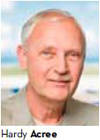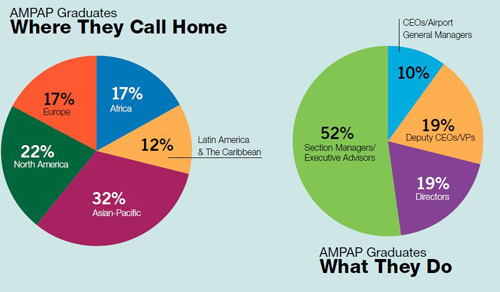Professional Accreditation Provides Gateway to Global Expertise

|
factsfigures Project: Airport Management Professional Accreditation Program Co-Sponsors: International Civil Aviation Organization & Airports Council International Approximate Length of Program: 3 years Approximate Cost: $3,000/Course Graduates to Date: 120 Program Administrator: Aviation Strategies International Languages: Currently, the program is only offered in English; Chinese, French & Spanish are being considered |
Recognizing an ongoing need for the professional development of airport managers, the International Civil Aviation Organization (ICAO) and Airports Council International (ACI) launched an accreditation program in 2007. With the recent graduation of its first class, 120 people from roughly 80 countries have earned the designation of International Aviation Professional (IAP).
The Airport Management Professional Accreditation Program (AMPAP) typically takes about three years to complete. The first phase is a five-day gateway course titled "Air Transport System" held at a host airport. (McCarran International in Las Vegas is a designated site for December.) Sessions are designed to help participants become acquainted with one another in an effort to bridge communication gaps and encourage long-term networking between airport managers throughout the world. "Since you are out of your normal work area, you're dedicated to that portion of the program at that time, which allows you a better opportunity to learn more in depth," explains one graduate.
The second portion of the program is a series of Web-based modules, some requiring managers to collaborate with peers they met during the initial sessions. Mandatory online classes include: Airport Master Planning, Development and Environmental Management; Airport Operations, Safety and Security; and Airport Commercial and Financial Management. 
The final part of the program requires managers to complete two elective courses. One option is a team-based module that involves managing an airline for a week. The group makes detailed decisions about leasing or buying aircraft, route selection, flight frequency and price, and advertising expenditures. "It kind of puts a different spin on what we do on a daily basis to understand how complex a job the airlines have," says AMPAP graduate Cheryl Marcell, former deputy director of marketing and public relations for the Sacramento County Airport System.
 Hardy Acree, director of the Sacramento County Airport System, shares Marcell's enthusiasm: "The subject matter covered is not only timely but also very relevant to what a professional training program should cover."
Hardy Acree, director of the Sacramento County Airport System, shares Marcell's enthusiasm: "The subject matter covered is not only timely but also very relevant to what a professional training program should cover."
Acree has celebrated the AMPAP graduation of two staff members and anticipates another this year. "We are only as good as we know how to be," he muses. "This program helps polish existing skills while also broadening an individual's knowledge on other areas of expertise in airport management."
The Faces of AMPAP
Aeroports de Montreal has two graduates of the program and seven more working toward AIP accreditation.
"I have long felt that the most important aspect of the program, and one that must be preserved at all costs, is the opportunity for the participants to network with their peers across the world," says James Cherry, president and CEO of Aeroports de Montreal. "I have visited airports throughout the world and met with colleagues from all sorts of organizations, and I have never come away without a new idea or solution to a problem."
With 13 years under his belt, Karl Brochu, assistant director, operations - planning and coordination for Aeroports de Montreal, agrees: "Through the AMPAP program, we're able to have closer contact with an airport, where we would not have had otherwise. I'm just a click or phone call away from any graduate and their resources."
Camaraderie among AMPAP graduates from all classes is facilitated via AMPAP Talk, a Web-based network designed to help IAPs connect, seek resources and encourage their peers. To date, it has evolved into a Facebook style forum, with airport managers posting everything from commentary about daily work struggles to family photos.
The Big Picture
In addition to promoting professional excellence among airport managers, increasing their expertise and encouraging them to share that expertise, AMPAP focuses on establishing uniform standards.
"We have to take into consideration that the airlines are flying throughout the world and expecting to be treated in similar ways," says Brochu. "AMPAP makes us understand a little bit more the aviation system as a whole. Then, when we make decisions locally, we are considering the impact globally."

According to Cherry, the AMPAP curriculum is a potent antidote to "not-invented-here syndrome" - an affliction he says affects all airports to some degree. By gaining access to peers around the world, IAPs connect with other managers who have already dealt with, or are currently wrestling with, the same problems they face, he explains. Such communication can prevent everyone from "reinventing the wheel."
Marcell believes that IAP certification raises the profile of graduates' home airports. "We're looked at as leaders in the aviation industry," she explains, also crediting Acree's long-time involvement in ACI, North America and ACI World. "That gives us a voice as things are being debated in Washington, D.C. or Montreal. We really have a seat at the table."
On an individual level, AMPAP graduates can receive associate degrees in airport management from ICAO, ACI, civil aviation directorates of ICAO member states and ACI World Business Partners. In addition, the business school at the University of Toulouse in France currently gives one full course credit for each AMPAP course toward its MBA in airport management.
Return on Investment
Although Marcell's everyday responsibilities focus on public relations, she finds tremendous take-away value from other areas of her AMPAP coursework. "It helps that I've become a mini-expert on a lot of different topics," she relates.
Her studies, for instance, may not qualify Marcell to execute an airport's master plan, but knowing the components and intricacies of such an undertaking "makes us more informed buyers of the professional resources that we would need," she explains.
Marcell also credits her IAP accreditation as a factor in her recent hiring as director of communications and events for ACI.
Brochu cites the ability to effectively communicate with other departments as a valuable product of his AMPAP training. The certification curriculum also prompted him to reflect on his earlier days as a security specialist, when he tended to have a more limited view of the industry. These days, the IAP makes decisions based on "the whole picture."
The education and perspective gained through AMPAP "makes your work a lot easier," he explains. "You start to understand, 'Ahh ... that's why I'm doing this and this person's doing that.'"
Simply put, the program is impacting the next generation of airport managers, says Paul Behnke, senior business advisor for ACI and AMPAP team leader for the first four years of the program. "AMPAP catches them at a point in their careers when they are still very passionate and have plenty of energy," relates Behnke. "We've created a community. People really appreciate it, and want it to grow and prosper."
But AMPAP's future wasn't always so rosy. Although ACI and ICAO's research showed considerable demand for an accreditation program, they had to market the courses intensively - literally one participant at a time, he recalls. "We'd been through one of the worst recessions globally of all time," Behnke recalls. "Training programs were being slashed at airports all over the world. But because we had established AMPAP's reputation in 2007 and 2008, the recession hardly dented our program."
Today, the organizations take pride in seeing IAP credentials listed on airport managers' business cards and noticing glass IAP sculptures sitting on their desks. "We've created something that has intrinsic value in the global network of airport professionals," says Behnke.
FREE Whitepaper
PAVIX: Proven Winner for All Airport Concrete Infrastructure
International Chem-Crete Corporation (ICC) manufactures and sells PAVIX, a unique line of crystalline waterproofing products that penetrate into the surface of cured concrete to fill and seal pores and capillary voids, creating a long lasting protective zone within the concrete substrate.
Once concrete is treated, water is prevented from penetrating through this protective zone and causing associated damage, such as freeze-thaw cracking, reinforcing steel corrosion, chloride ion penetration, and ASR related cracking.
This white paper discusses how the PAVIX CCC100 technology works and its applications.








